Show me your office – Lars Bo Nielsen
Lars Bo Nielsen is dean of the Faculty of Health. He’s also a major Tintin fan and admits that he left a lot of baggage behind – including the academic quarter – when he moved from Copenhagen to Aarhus.
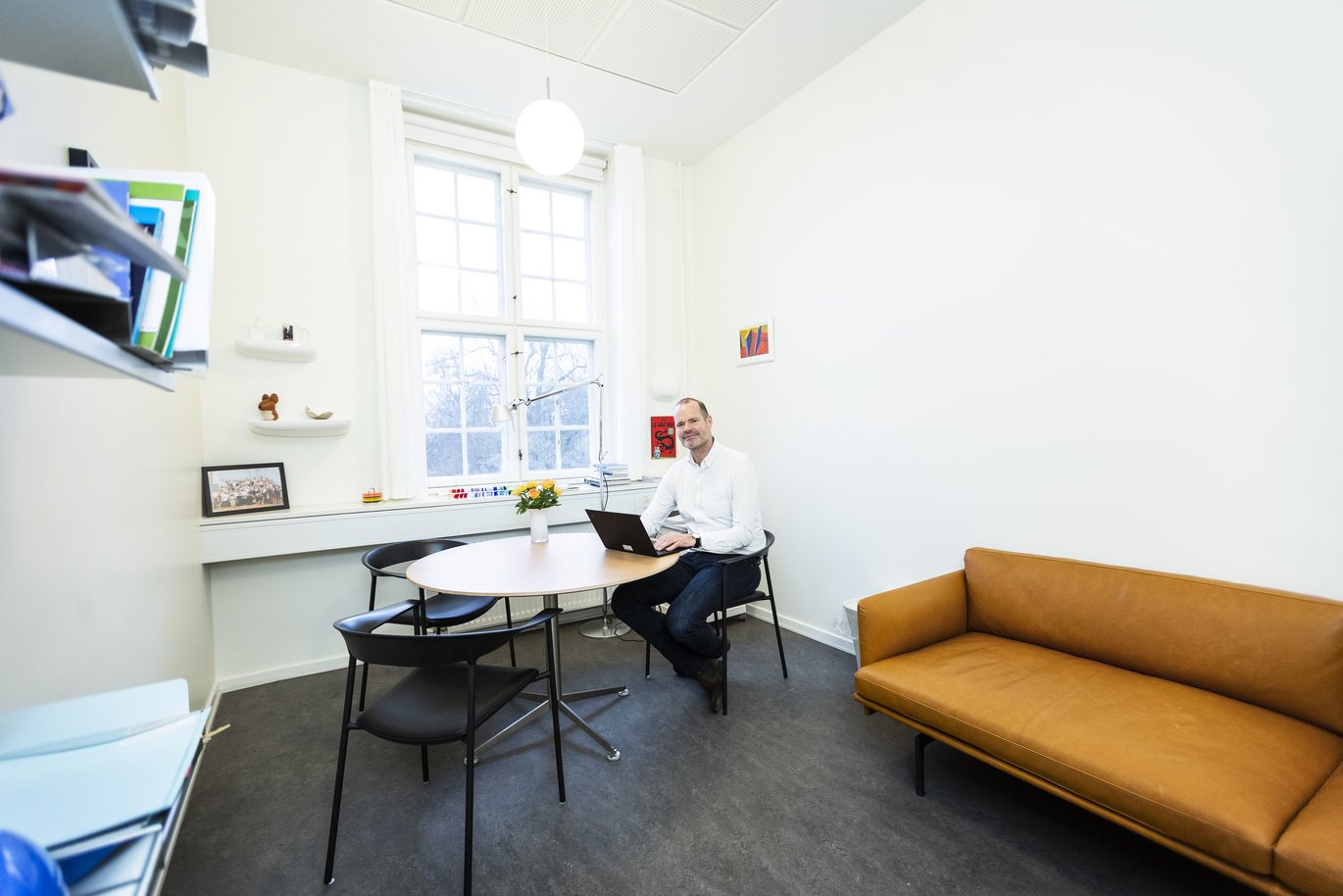
“I don’t have that many gadgets that I imagine other people might have as well,” Lars Bo Nielsen states.
And no. He certainly doesn’t. Lars Bo Nielsen, dean of the Faculty of Health, doesn’t have much room in his office, which is probably about 14m2 – and it’s also pretty empty. There’s just a leather couch, a bookshelf on the wall and a small round table. In fact, when Omnibus’ photographer enters the dean’s office, he proposes doing the shoot in the dean’s actualoffice, where his desk is. But that’s where we are, appearances notwithstanding.
Nielsen laughs and asks jokingly:
“Why? Is my office too small?”
He pulls out his laptop, places it on the small round table and opens it.
“See, my conference table is now my desk,” he says proudly, stroking the tabletop.
He specifically requested a round table instead of the usual rectangular adjustable height desk:
“People shouldn’t feel like they’re sitting across from me, but that there’s equal communication – or as equal as it can be considering I’m the boss,” says the dean.
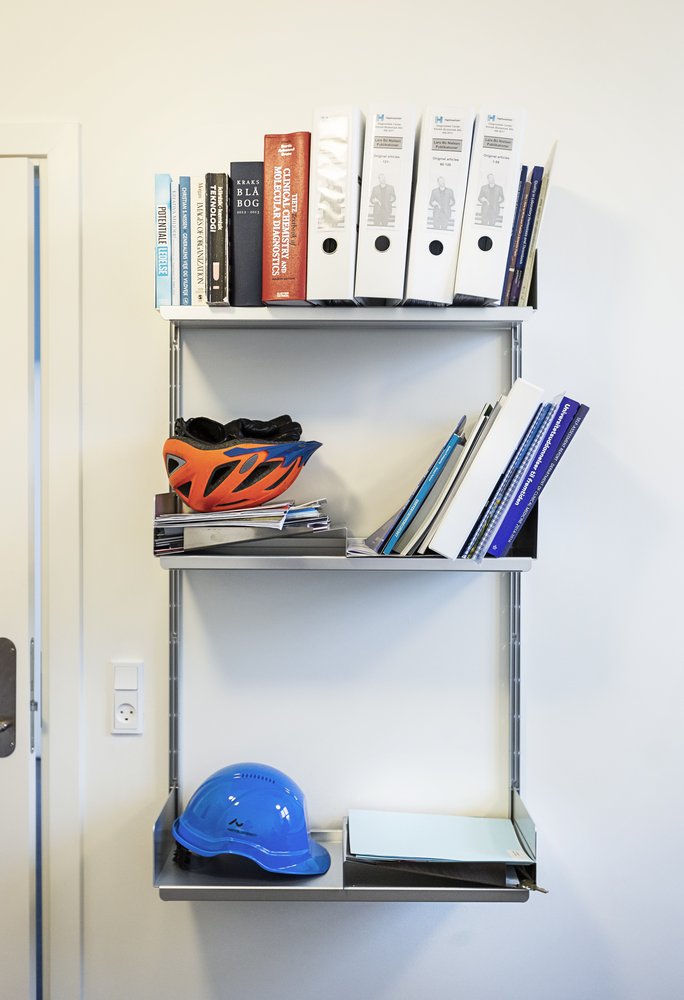
“I sit at the end of the table in a lot of situations, and so I don’t feel a need to sit there in my own office,” says Lars Bo Nielsen about his round office table.
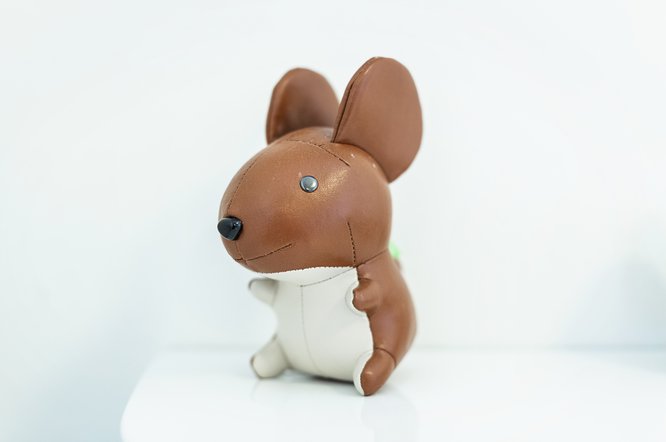
The mouse was a gift from his former research group at UCPH, which among other things worked on cholesterol in mice.
A major clear-out - but Tintin survived
When Nielsen left his former job as department head at the University of Copenhagen (UCPH) to become dean of the Faculty of Health in Aarhus about eighteen months ago, he didn’t bring much with him:
“In Copenhagen, I had all the dissertations, all the Master's theses and a bunch of books. But I’ve thrown a lot of stuff out, archived a few special things and I only have a few books with sentimental value in my office now, “ he explains:
“It suits me fine that that’s all there is. Everything I need is on the computer.”
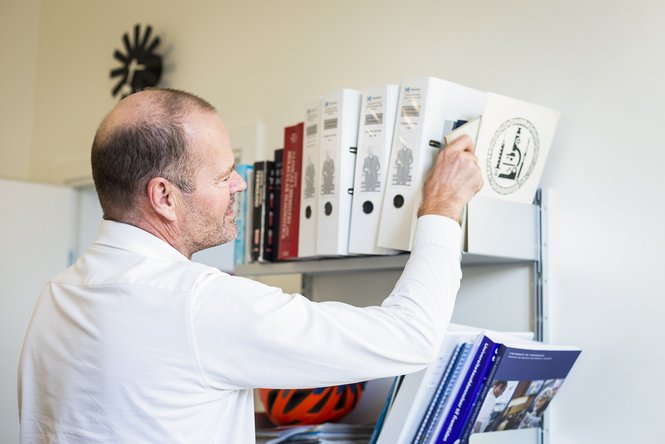
The same applies to his domestic affairs: Nielsen exchanged a house with a basement and garden in Copenhagen for a smaller apartment in Aarhus Ø:
“And it has really big windows,” he says, pointing at a big painting he had to find room for in the office.
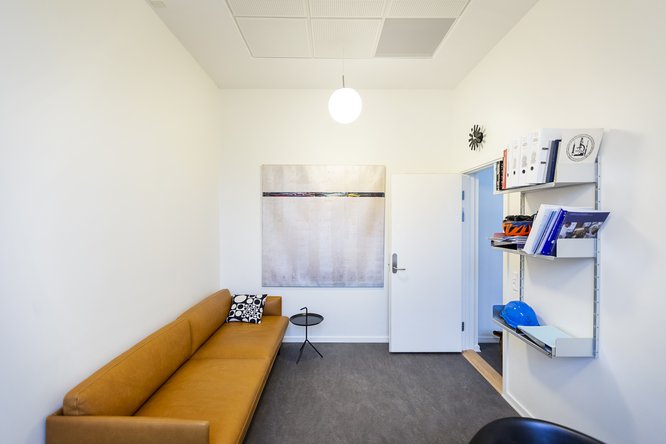
However, the most essential possessions survived the move. Including, of course, the dean’s Tintin paraphernalia, such as a framed picture made of woven Tintin cutouts he bought on the island of Samsø that’s on display in his office.

“Tintin is a big part of my life. I read all the books when I was a kid. I read them out loud for my kids, and now they’ve read them themselves. They are incredibly entertaining.”
There’s an old flame-red Tintin book cover he bought in Vietnam – Le Lotus Bleu(The Blue Lotus).
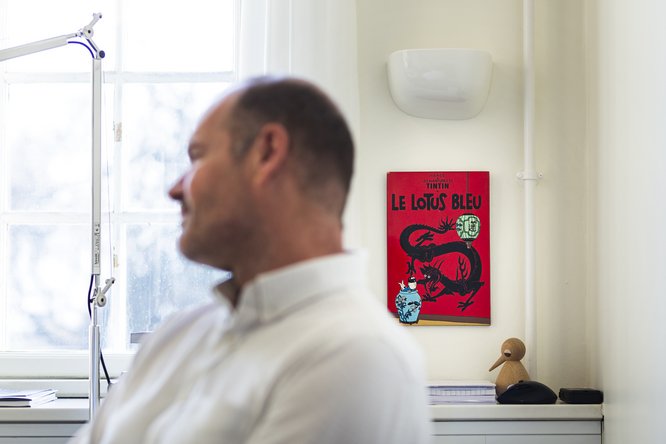
“Everything I know about the opium wars in China is from The Blue Lotus. And when I hear something about oil drilling, I always think of Land of Black Gold. You can really learn a lot about countries and geography from Tintin,” he recommends.
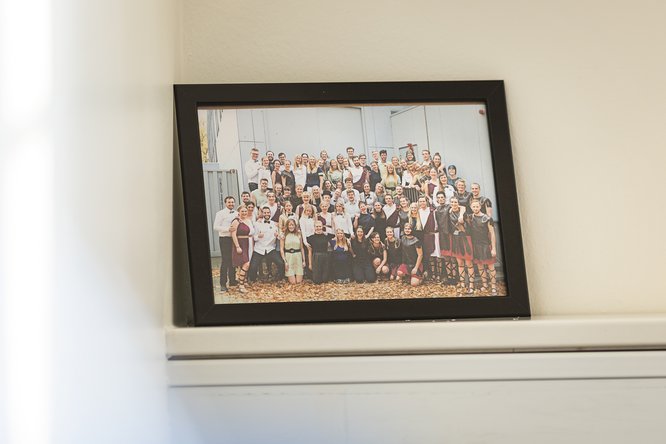
The object in his office that means the most to the dean is a photo of the Medical Student Revue he was given last year. “It reminds me of the reason we’re here – namely the students. And now I’ve seen the revue too – and what a group of young people, whose resources, energy and talent reach far beyond the field of medicine,” he says.
We'll just give them a call
Office decor wasn’t the only thing that became simpler when Nielsen came to AU from UCPH in 2017. That also happened to some aspects of his work.
“Things are informal at AU. You don’t need long memos and protocols to have a meeting. There’s a completely different culture of collaboration here. You can just pick up your phone and call people – including after work,” he says, and shares an anecdote from his first day at AU:
“We had received an enquiry from the region, and so I told my secretariat that we would need to sit down and figure out how we were going to answer it, and what tone the answer should have. They just looked at me and asked: ‘What do you mean? We’ll just give them a call.' The next day I was told that it had been dealt with, and that I didn’t need to give it any more thought.”
This is not to say that the job of dean itself is any easier than he had expected:
“There are a lot of daily dilemmas, often between resources and needs, but sometimes between fields. It’s challenging to manage forensic pathologists and dentists not having any specialist insight into their work. What’s more, my dialogue is often not with them, but with their managers.”
He adds:
“But after all, that’s often what managers do – manage people in areas they don’t have a specialist’s insight into.”
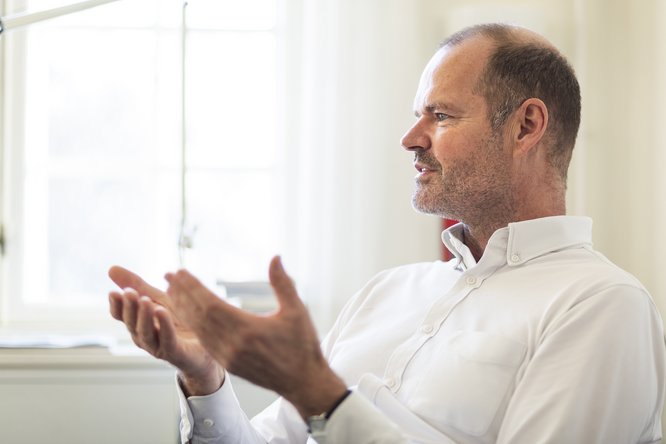
“As dean, I miss the immersion in science that’s connected with research. But on the other hand, it’s satisfying to be part of creating conditions (for research, ed.) that I would have valued myself.”
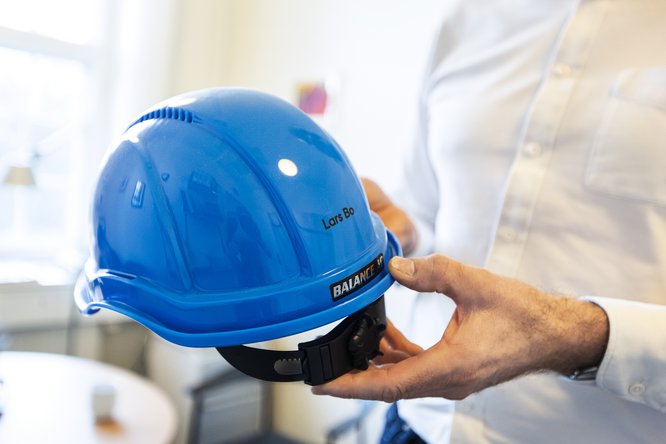
His very own safety helmet. The dean was given one in connection with the construction of the Skou Building. Now he uses it when inspecting the Bartholin Building, and he’ll soon need it in Skejby as well. “I’ll need it for many years,” he says.
The academic quarter is cancelled in Aarhus
Nielsen also had to learn some new social ground rules when he moved to Aarhus:
“If you invite people in Aarhus, they show up on time. But in Copenhagen, you show up within fifteen minutes. So if you invite someone to come at 1pm, in Copenhagen, they just need to get there before 1:15pm.”
Does that mean that you showed up late a lot when you moved to Aarhus?
“Just once. That was at the first faculty party. I had just moved, and I had no idea that it was like that, you see. The secretariat had asked me to come a little early so I could welcome people when they arrived. The party was set to start at 6pm, so I arrive ten minutes before that. But by then almost everyone had already arrived.”
Nielsen laughs.
“I positioned myself by the door to greet the last arrivals. But the few people who came in the door had no idea who I was and walked right past me. I stood there for five minutes before I concluded that I would have to try again next year.”
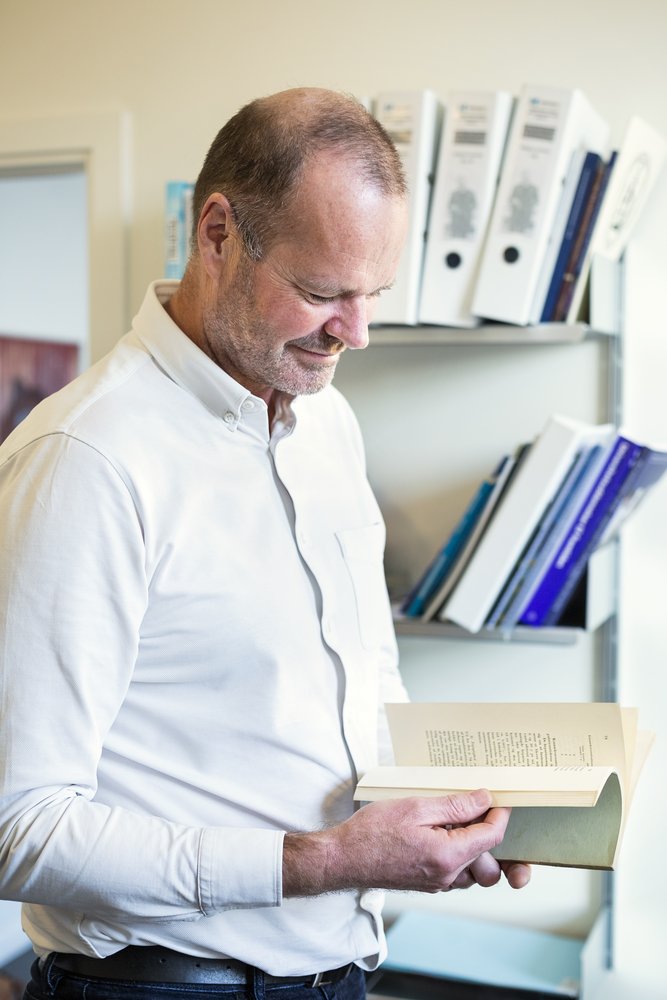
The dean is partial to polite turns of phrase. Instead of announcing that the meeting is over, he invites me outside and asks for a ‘bio-break’: “I think it’s a very elegant way of saying that you need to make it to the bathroom before your next meeting,” he explains.
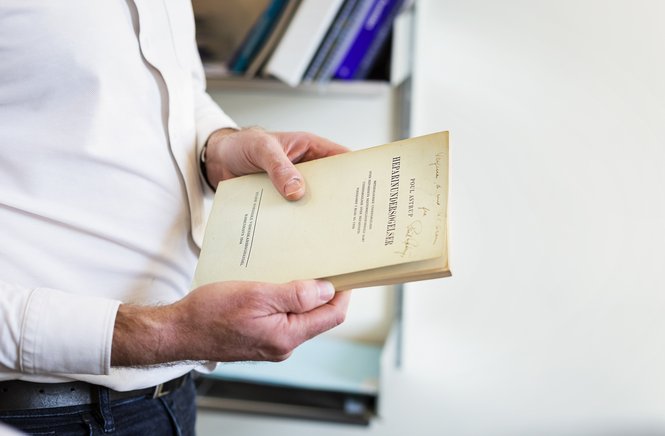
The subject of Poul Astrup’s 1944 higher doctoral dissertation was the coagulation of the blood. He was the first professor of clinical chemistry in Denmark, and he presented Lars Bo Nielsen with a copy of the dissertation himself when Nielsen was responsible for patients with blood clots during his time at Rigshospitalet.

